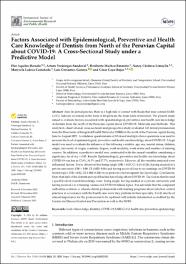Mostrar el registro sencillo del ítem
“Factors Associated with Epidemiological, Preventive and Health Care Knowledge of Dentists from North of the Peruvian Capital about COVID-19: A Cross-Sectional Study under a Predictive Model “
| dc.contributor.author | Aquiles-Barzola, Flor | es_ES |
| dc.contributor.author | Verástegui-Sandoval, Arturo | es_ES |
| dc.contributor.author | Machco-Pasmiño, Heriberto | es_ES |
| dc.contributor.author | Córdova-Limaylla, Nancy | es_ES |
| dc.contributor.author | Ladera-Castañeda, Marysela | es_ES |
| dc.contributor.author | Cervantes-Ganoza, Luis | es_ES |
| dc.contributor.author | Cayo-Rojas, César | es_ES |
| dc.date.accessioned | 2023-03-16T16:15:44Z | |
| dc.date.available | 2023-03-16T16:15:44Z | |
| dc.date.issued | 2023-01-05 | |
| dc.identifier.uri | https://hdl.handle.net/20.500.13053/8117 | |
| dc.description.abstract | “Aim: In dental practice there is a high risk of contact with fluids that may contain SARSCoV-2. Salivary secretions in the form of droplets are the main route of infection. The present study aimed to evaluate factors associated with epidemiological, preventive and health care knowledge of dentists from the north of the Peruvian capital about COVID-19. Materials and Methods: This analytical, observational, cross-sectional and prospective study evaluated 142 dental professionals from the Directorate of Integrated Health Networks (DIRIS) in the north of the Peruvian capital during June to August 2022. A validated questionnaire of 20 closed multiple-choice questions was used to measure the level of epidemiological, preventive and health care knowledge about COVID-19. A logit model was used to evaluate the influence of the following variables: age, sex, marital status, children, origin, university of origin, academic degree, work modality, work status and number of training courses. In addition, a predictive model was constructed with the causal variables considering a significance level of p < 0.05. Results: Epidemiological, preventive and health care knowledge about COVID-19 was fair in 17.6%, 34.5% and 57.7%, respectively. Likewise, all the variables analyzed were influential factors. It was observed that being single (OR = 0.05, CI: 0.01–0.26), having studied at a private university (OR = 0.09, CI: 0.023–0.38) and having received four to six trainings on COVID-19 related topics (OR = 0.02, CI: 0.002–0.238) were protective factors against fair knowledge. Conclusions: More than half of the dentists surveyed had fair knowledge about COVID-19. The factors that favored a good level of overall knowledge were: being single, having studied at a private university and having received 4 to 6 training courses on COVID-19-related topics. It is advisable that the competent authorities continue to educate dental professionals with training programs about infection control practices in accordance with the health care work they perform in their specialty. It will also be of utmost importance for the professional to be updated with reliable information accredited by the Centers for Disease Control and Prevention as well as the WHO.“ | es_ES |
| dc.format | application/pdf | es_ES |
| dc.language.iso | eng | es_ES |
| dc.publisher | MDPI | es_ES |
| dc.rights | info:eu-repo/semantics/openAccess | es_ES |
| dc.rights.uri | https://creativecommons.org/licenses/by/4.0/ | es_ES |
| dc.subject | level of knowledge; dentistry; COVID-19; SARS-CoV-2; health care; prevention; epidemiology | es_ES |
| dc.title | “Factors Associated with Epidemiological, Preventive and Health Care Knowledge of Dentists from North of the Peruvian Capital about COVID-19: A Cross-Sectional Study under a Predictive Model “ | es_ES |
| dc.type | info:eu-repo/semantics/article | es_ES |
| dc.identifier.doi | "https://doi.org/10.3390/ ijerph20021020" | es_ES |
| dc.type.version | info:eu-repo/semantics/publishedVersion | es_ES |
| dc.publisher.country | CH | es_ES |
| dc.subject.ocde | http://purl.org/pe-repo/ocde/ford#3.03.00 | es_ES |
Ficheros en el ítem
Este ítem aparece en la(s) siguiente(s) colección(es)
-
SCOPUS [380]


